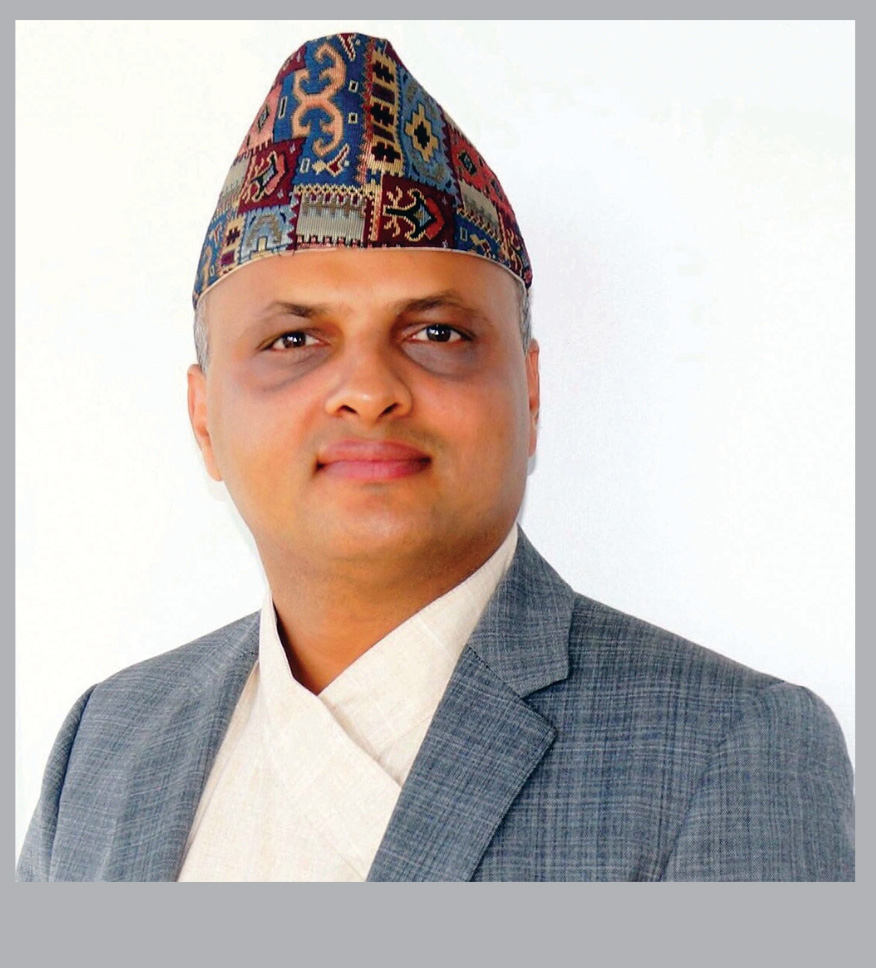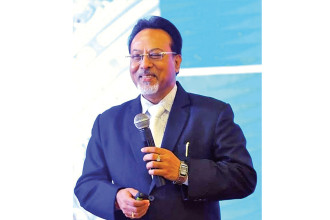
Kumar Panta is the newly elected President of Non-Resident Nepali Association (NRNA). Born in Phujel of Gorkha district, he lives in Germany and is an entrepreneur. Panta was the Vice-President of the organisation for the past two terms and is now leading NRNA for the next two years after he won the elections in October this year.
Dibesh Dangol of B360 interviewed Panta regarding his agenda as President of NRNA, plans to integrate and unite the global Nepali diaspora, and issues regarding dual citizenship. Excerpts:
What is your agenda as the newly appointed President of NRNA?
NRNA, since its very inception, has been involved in protecting and promoting the rights of non-resident Nepalis and mobilising the NRN resource, whether it is their financial resources or knowledge, skill or networks they have developed outside of Nepal in the interest of the country and the people. I believe in continuity and my agendas are also a continuation of the past agenda. Having said this, I would like to highlight that during the election campaign I had emphasised on making the much talked about Rs 10 billion investment fund happen and reform our entire organisational setup and processes so that we can be smarter and modern. The issue of linking Nepal with the diaspora knowledge pool and enlarging the knowledge and skill levels of the Nepali people is our prime agenda. We will complete the ongoing initiatives and projects and focus more on doing sustainable things.
How is your leadership planning to assist Nepal government with Visit Nepal 2020 tourism campaign and attracting FDI in Nepal?
Promoting Nepal as a major tourist destination in the world will be one area we will be working with vigour. We have already signed an MOU with the government. We will be working with the government to organise promotional activities. NRNA has initiated campaigns like send three friends home. We have been organising Nepal festivals in various countries. NRNA has its network in more countries than the residential missions of the government. We are and will be working with the government to popularise Nepal, Nepali culture and heritage.
Visiting friends and relatives are a growing segment in the global tourism flow. There are NRNs in an increasing number around the globe. Through our network, we are encouraging people to come back to Nepal for holidays.
We will be using Nepali owned and involved businesses very extensively in promoting Nepal as a tourist destination. There are so many Nepali owned restaurants and stores around the globe. The tourism promotion in my view is a win-win proposition for the NRN community.
What are your plans for integrating and uniting the global Nepali diaspora?
The global Nepali diaspora is as diverse as the Nepali population itself. The issues and concerns of the diaspora may be diverse and different and we may represent different strata of the Nepali population, but one thing unites all of us and that is the love for the motherland and the eagerness to see Nepal prosper. It is only when the country is prosperous that its citizens command respect and prestige in the international arena.
Our efforts will be to make foreign employment more secure and trustworthy for those going for foreign employment. We are also increasing our efforts and ability to serve those in distress during foreign employment.
As of today, for many Nepali youths, foreign employment is a compulsion because there is little scope to find good-paying jobs in Nepal. We aim to make it a matter of choice rather than compulsion. Then channelling the earnings of foreign employment to investment rather than consumption is a challenge for everybody. We will be establishing an investment fund with a corpus of Rs 10 billion. There will be a special window for investment by persons in foreign employment.
We are working with the government on framing a law providing legal status for NRNs. The law will define what the NRNs can and cannot do.
Are you aware of the ‘Desh Farkam Abhiyan’? What are your views?.
Our goal is to see Nepal prosper. In my view, the diaspora can contribute in many ways. It is not required for everybody to return home. For example, if as a tour operator located outside of Nepal, I am bringing many tourists, I may be able to contribute more by being located outside of Nepal rather than by coming back and competing for jobs here. Having said this, the people who have acquired knowledge and skills needed for Nepal and have resources should be encouraged to come back and contribute to the motherland. In short, it should be a choice for every individual. We are in a global world which is why we should not remain in cocoons.
What is the status of dual citizenship that NRNA has been lobbying for?
Immediately after the election, I had the opportunity to meet our leaders including the Chairperson of the Governance and State Management Committee. We are concerned about the delay. We have been given to understand that there is agreement on the provision regarding NRN citizenship as provisioned in the Constitution of Nepal. But there are differences among political parties on the issue of providing citizenship to foreign spouses of Nepali citizenship. We are hopeful that the issue will be resolved and the citizenship amendment will be dealt with in the upcoming parliament session.
NRN Infrastructure and Development is presently involved in four hydropower projects; is it associated with NRNA?
NRN Infrastructure and Development is an investment company promoted by NRN friends. NRNA is a not-for-profit institution and is not involved in the company. However, many NRN friends including those in the leadership of NRNA are involved in this company. This company is a business entity and runs as per the company law. Our role is limited to encouraging and supporting such companies; after all, one of the objectives of NRNA is to promote NRN investment in Nepal. We believe that we need to bring together scattered resources to execute large scale projects.
There is widely shared belief that NRNA makes loud promises but it doesn’t translate into contribution for the country. Your views.
I know about the criticism. In Nepal, we seem to expect too much. At the same time, individuals don’t care about what they have assured and what they have delivered. We need to develop the habit of being realistic and truthful. About NRN’s contribution, my conclusion is that they have done a lot, but there is scope to increase that by many folds. We need a proper mapping of the contribution and assessment of potential. Of course, there may have been instances of individuals claiming that they will deliver the sky. The past has taught us many valuable lessons. We need to develop a mechanism of celebrating success. We should not be euphoric about NRNA. It cannot solve all problems or ills of Nepal. Nor should we be apologetic that we have not done anything.
News regarding internal conflicts and NRNA turning into a political body keep surfacing. NRNA Founding President Dr Upendra Mahato also boycotted this year’s NRNA conference citing increasing politics in the association. Your comments
You are probably talking about the scene seen during the election. NRNA as an institution is apolitical. NRNs as individuals may be politicised. They may have ideologies and leanings. I for one have never emphasised my ideology or political leaning or preferences. Politicisation is a two-way process.
When individuals in the association are willing to use the influence of the political parties and the political parties are willing to advocate or put their entire weight on someone, then the problem arises.
In Nepal, the parties and especially their sister organisations seem to look at issues from a binary angle. For them, it is victory at any cost. So, a great part of the blame for the election campaign on political or ideological lines goes to the parties themselves. We should be ready to see apolitical institutions. But to be honest, if you look at the results or outcome of our election, there is enough evidence to see that NRNs are not divided into political lines. This is very reassuring.






